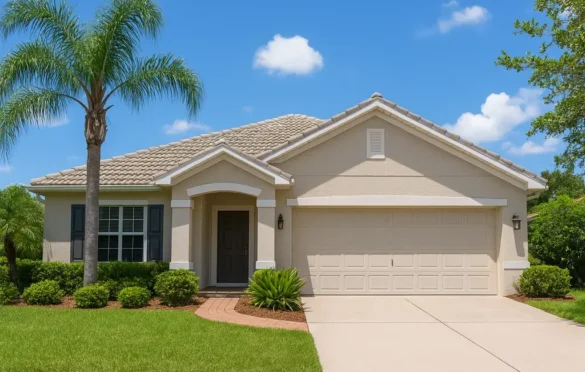Explore this post with:
Your home is your sanctuary, and the roof above it plays a crucial role in keeping it safe, dry, and comfortable. Residential roofing goes beyond aesthetics—it’s about choosing the right materials, ensuring proper installation, and keeping up with regular maintenance to protect your family and your property. Whether you’re building a new home, replacing an old roof, or maintaining your existing one, understanding the ins and outs of residential roofing will help you make informed decisions. In this guide, we’ll explore the key aspects of residential roofing and provide tips on choosing the right contractor.
Residential Roofing Services
A trusted NEPA residential roofing contractor offers a range of services designed to keep your roof in optimal condition. Here’s an overview of the most common residential roofing services:
Roof Installation: If you’re building a new home or need a complete roof replacement, roof installation is a key service. It involves selecting the right roofing materials, preparing the structure, and ensuring proper installation to protect your home for years to come.
Roof Repairs: From minor leaks to storm damage, timely roof repairs prevent further issues and extend the life of your roof. Contractors can address everything from missing shingles to more complex problems like damaged flashing or structural issues.
Roof Replacement: When your roof has reached the end of its lifespan or is too damaged to repair, a full roof replacement is necessary. This involves removing the old roofing material, inspecting the roof deck, and installing a new roof system that meets current standards.
Roof Inspections: Regular roof inspections help identify potential issues early on, preventing costly repairs down the line. Inspections also ensure that your roof remains in compliance with local building codes and warranty requirements.
Roof Maintenance: Ongoing maintenance services such as cleaning, gutter clearing, and small repairs are essential for extending the lifespan of your roof. Maintenance helps prevent problems like moss growth, leaks, and damage caused by debris.
Choosing the Right Roofing Material
The material you choose for your roof will impact its durability, appearance, energy efficiency, and cost. Here are some of the most popular residential roofing materials and their benefits:
Asphalt Shingles: The most common residential roofing material, asphalt shingles are affordable, durable, and available in various colors and styles. They are easy to install and offer good protection in most climates.
Metal Roofing: Known for its longevity and energy efficiency, metal roofing can last 40 to 70 years with proper maintenance. It’s resistant to fire, insects, and harsh weather, making it a popular choice for homeowners looking for durability.
Clay and Concrete Tiles: These tiles provide excellent insulation and are extremely durable, making them ideal for hot climates. Their distinct appearance is a favorite for Mediterranean and Spanish-style homes, although they require a strong roof structure due to their weight.
Slate Roofing: Slate is a high-end roofing material that is not only visually stunning but also incredibly durable, with some roofs lasting more than 100 years. However, slate is one of the most expensive options and requires expert installation.
Wood Shakes and Shingles: For a natural, rustic look, wood shakes and shingles offer great aesthetics. While they require more maintenance than other materials, they provide good insulation and are often made from sustainable materials.
Synthetic Roofing Materials: These materials are designed to mimic natural options like slate or wood, offering a similar appearance at a lower cost. Synthetic roofs are often lightweight, durable, and come with long warranties.
When choosing roofing materials, consider factors such as your local climate, your home’s architectural style, your budget, and the longevity you expect from your roof.
Signs You Need Roof Repair or Replacement
Even the best roofs eventually show signs of wear and tear. Here are some common indicators that it’s time to repair or replace your roof:
Missing or Damaged Shingles: If you notice shingles that are missing, cracked, or curling, it’s a clear sign that your roof needs attention.
Water Leaks: Water stains on ceilings or walls are a strong indicator of roof damage. Leaks can lead to mold, wood rot, and structural issues if not addressed promptly.
Age of the Roof: Most asphalt shingle roofs last about 20 to 25 years. If your roof is nearing this age, it’s time to start considering a replacement, even if it seems to be in good condition.
Granules in Gutters: If you find granules from your asphalt shingles in your gutters, it’s a sign that the shingles are deteriorating and may need to be replaced.
Sagging Roof: A sagging roof is a serious issue that could indicate structural damage. This is typically caused by water damage or inadequate roof supports and requires immediate attention.
Excessive Energy Bills: If you’ve noticed a spike in your heating or cooling costs, it could be due to poor roof insulation or ventilation, which may warrant repairs or replacement.
How to Choose a Residential Roofing Contractor
Choosing the right contractor is crucial for a successful roofing project. Here are some tips to ensure you select a reliable and experienced contractor:
Licensing and Insurance: Verify that the contractor is licensed and insured to perform roofing work in your area. This protects you from liability in case of accidents or damage during the project.
Experience: Look for a contractor with extensive experience in residential roofing. Ask for examples of similar projects they’ve completed and check online reviews from previous clients.
Warranty: Ensure the contractor offers a warranty on both materials and workmanship. This provides peace of mind knowing that your investment is protected.
References: Ask for references from past customers to get a sense of the contractor’s work quality and customer service.
Clear Communication: Choose a contractor who is upfront about the scope of work, costs, and timelines. Good communication ensures that there are no surprises during the project.
Taking the time to research and choose the right contractor will ensure that your residential roofing project is completed to the highest standards.
Conclusion
Your roof is one of the most important components of your home, providing protection from the elements and ensuring the safety of your family. Whether you’re in need of repairs, maintenance, or a full roof replacement, working with an experienced residential roofing contractor is essential for getting the job done right. From selecting the best materials to ensuring proper installation and regular upkeep, investing in your roof is one of the best decisions you can make for your home.
In Case You Missed It!
About the Author: archistyladmin
At Architecturesstyle, we’re passionate about smart design, beautiful spaces, and practical tips that help you bring great architecture into everyday life. Whether it's modern home ideas, iconic buildings, or expert advice, our team brings fresh and useful content to readers who love architecture as much as we do.




